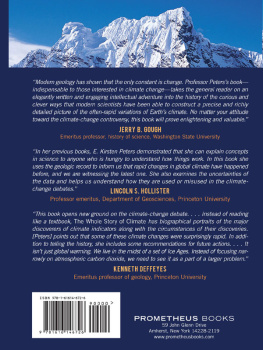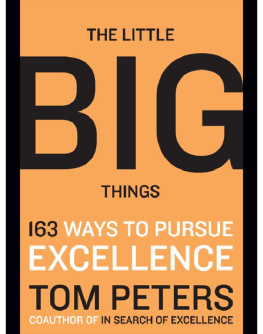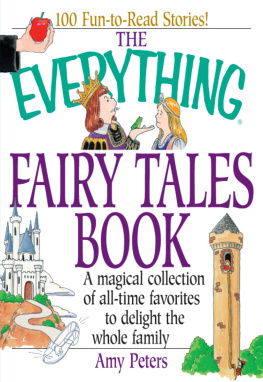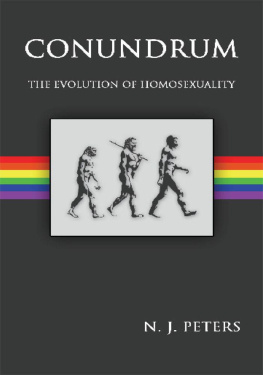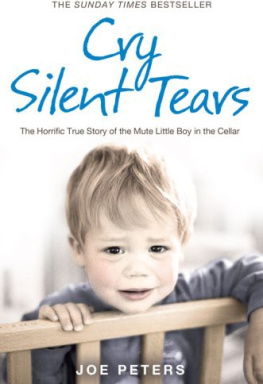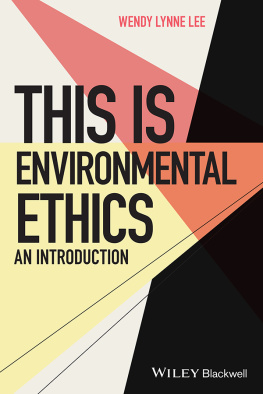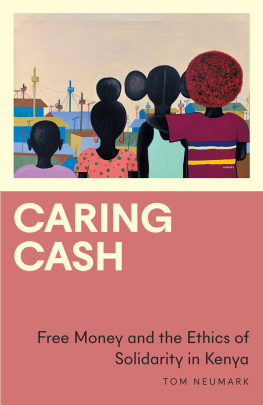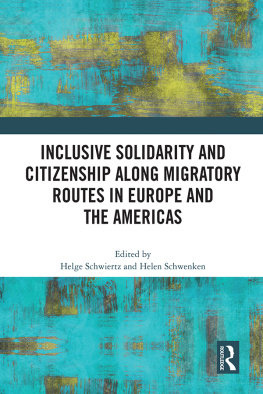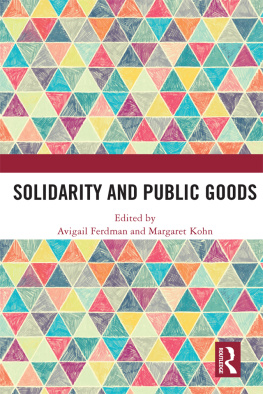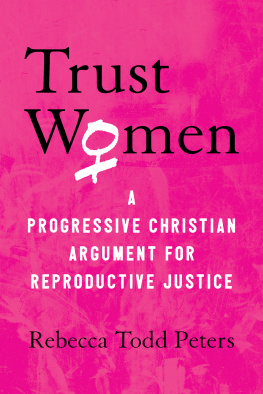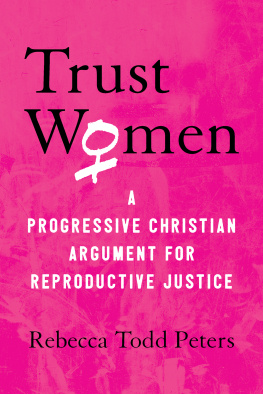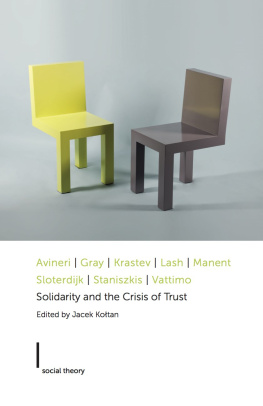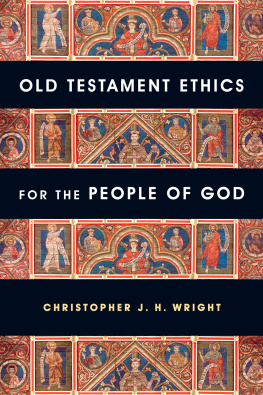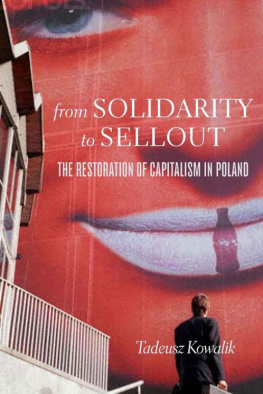Solidarity Ethics -- Solidarity Ethics
1
Praise for Solidarity Ethics
Authentic religions are born in a burst of moral energy, stoked by a passion for compassion and justice. If Christianity is sliding into irrelevance it is because fiery prophetic voices like that of Rebecca Todd Peters have not reached into the chilled hearts of those who without moral warranty call themselves Christians.
Daniel C. Maguire,Marquette University
Solidarity Ethics is a model of Christian feminist social ethicsrelational, outward-reaching, global, justice-oriented, and spiritually illuminating.
Gary Dorrien, Union Theological Seminary
This morally challenging book by Rebecca Todd Peters should be read by all who are concerned about the gross economic disparities in todays world and what they can do to change them. Solidarity Ethics not only provides a compelling treatise on solidarity as a theological and ethical principle but sets forth strategies for how it can be embodied by individuals and communities both here at home and far away.
Peter Paris,Princeton Theological Seminary
Solidarity Ethics
Transformation in a Globalized World
Rebecca Todd Peters
Fortress Press
Minneapolis
SOLIDARITY ETHICS
Transformation in a Globalized World
Copyright 2014 Fortress Press. All rights reserved. Except for brief quotations in critical articles or reviews, no part of this book may be reproduced in any manner without prior written permission from the publisher. Visit http://www.augsburgfortress.org/copyrights/contact.asp or write to Permissions, Augsburg Fortress, Box 1209, Minneapolis, MN 55440.
Unless otherwise noted, Scripture references are from the New Revised Standard Version Bible, copyright 1989 National Council of the Churches of Christ in the United States of America. Used by permission. All rights reserved.
Cover design: Rob Dewey
Cover art Thinkstock
Library of Congress Cataloging-in-Publication Data
Print ISBN: 978-1-4514-6558-7
eBook ISBN: 978-1-4514-6987-5
The paper used in this publication meets the minimum requirements of American National Standard for Information Sciences Permanence of Paper for Printed Library Materials, ANSI Z329.48-1984.
Manufactured in the U.S.A.
This book was produced using PressBooks.com.
this book is dedicated, in solidarity,
to the women and men in the ecumenical movement
who have become my cloud of witnesses
Contents
3
Preface: Seeing with New Eyes
At the age of twenty-four, I attended a young womens leadership development conference in Jamaica sponsored by three international faith-based organizations: the World Council of Churches, the World Student Christian Federation, and the World YWCA. We were a small group of thirty women in our twenties from all parts of the world; many of us were students, but some were also lawyers, ministers, and activists. For ten days, we shared stories of the political realities of our countries and talked about the challenges that women faced in our contexts. We learned about the political and cultural realities of poverty in Jamaica and developed strategies to strengthen our leadership skills. We ate together, swam together, prayed together, and played togetherbut mostly we talked. We talked about our lives, our experiences, our families, our hopes, and our dreams.
For the first time in my life, I developed relationships with women whose lives were radically different from my own. A woman from Hiroshima shared with us her experience of nuclear weapons as a second-generation survivor of the bomb, and described life for her mother who had lost her legs as a three-year-old in 1945. Women from Sri Lanka, Lebanon, and Liberia told about their experiences living in war-torn countries, and women from Asia spoke passionately about the growing problem of sex tourism, prostitution, and the exploitation of women. Others shared the struggles and challenges that young women face in their contexts, from unwanted pregnancy and access to education to dowries, violence, poverty, and rape.
But it was hearing the story of a young woman named Deysi that has haunted me for years. Late one afternoon, through tears, Deysi shared her experience of the civil war in El Salvador, which had only happened a few years earlier. A death squad had broken into her home and opened fire, killing everyone thereeveryone but Deysi. She watched as her brothers and sisters, mother and father were all gunned down in front of her. She had escaped only because she lay still, pretending to be dead. The room was silent while we listened to her words through a translator. Despite having read the stories of the mass killings and unspeakable torture that the death squads had inflicted on the people of El Salvador, I was unprepared for Deysis words. In the tropical setting of Ocho Rios, where we came together on neutral soil, sharing common meals and teatimes and talking about the call of Christ in the world to challenge social injustice, I was deluded into the perception that as young women, the thirty of us had more in common than we did. Rightly or wrongly, knowing Deysi changed everything. It was because of our common experience, our shared community, because we had broken bread together, because she sat across the room from me and I could look into her eyes, that her story moved me in a way that was different from the stories of people unknown to me.
Over and over again, my experience of national and international social justice work has confirmed that knowing people personally transforms a news story from an item of interest into something personal. Developing relationships with people across lines of difference offers the opportunity to see things differently, through the eyes of another. Given the limitations of our own narrow and specific vantage points, learning how to change our perspective can be an important factor in deepening our understanding of the world around us. Seeing the world through someone elses eyes can help to generate empathy while also contributing to a more nuanced analysis of social problems.
The experience of my first international ecumenical gathering was transformative in another way, involving an encounter on one of the last days while we were telling one another our plans for the future. When I shared that I felt that my calling was to help people, particularly those most marginalized, and that I planned to do this in mission work in the two-thirds world, a young Nigerian lawyer stood and addressed me from across the room. Firmly and resolutely, Sola said, If you want to help me and my people, the best thing that you can do is to go back to the United States and confront the powers of globalization that are destroying my country and my people. I was caught short; I did not know what to say. Solas words were an epiphany. As I talked with her later, Sola explained that my social location as a US American gave me a certain privilege of voice and access that she did not have. I could use that privilege responsibly by educating North Americans about the problems of global poverty and injustice and challenging the dominant powers of the International Monetary Fund (IMF) and World Bank, which are headquartered in our nations capital. Because we had developed a friendship, I was able to hear her words as the challenge of a sister and a friend, rather than as the reproachful words of a stranger. Building community together, studying the Bible, and working on tough issues over a period of ten days challenged us to move beyond pleasantries and ask each other hard questions about where we find God in todays world. God spoke to me through the voice of Sola, calling me to account for my privilege and challenging me to follow the way of Christ in working toward the establishment of peace and social justice in the world.


